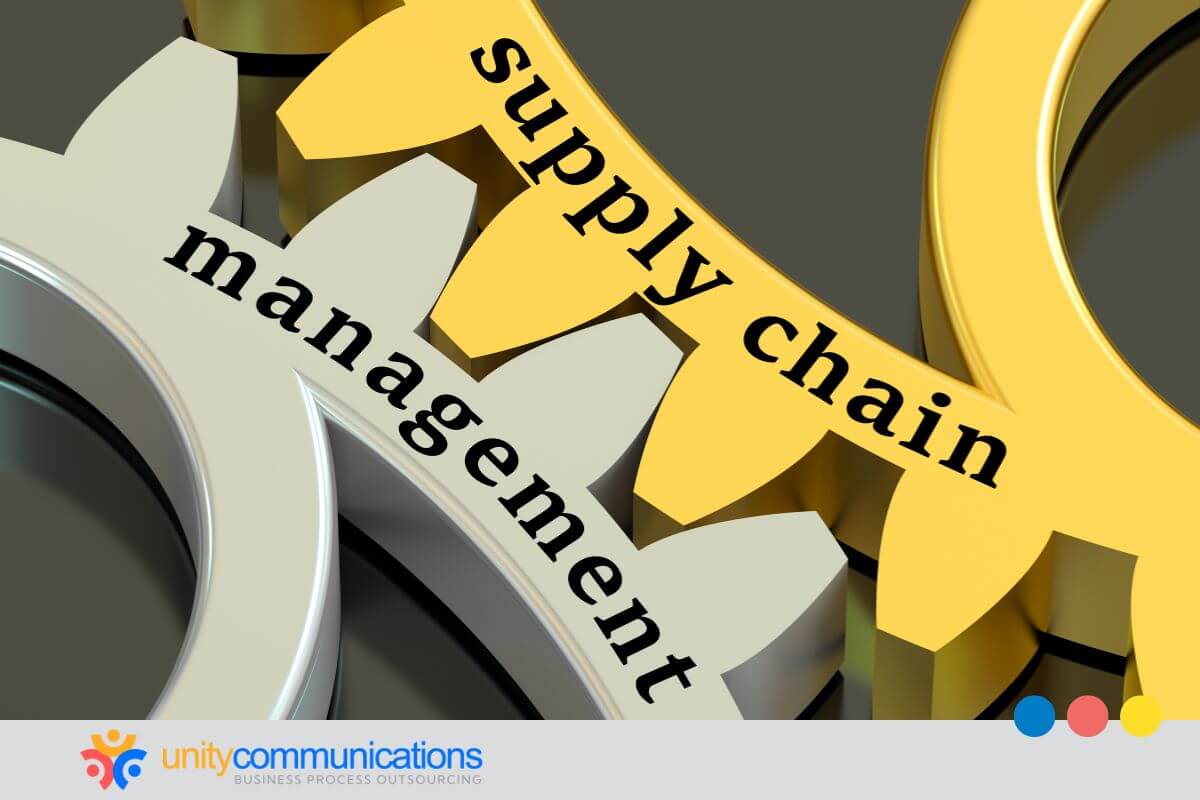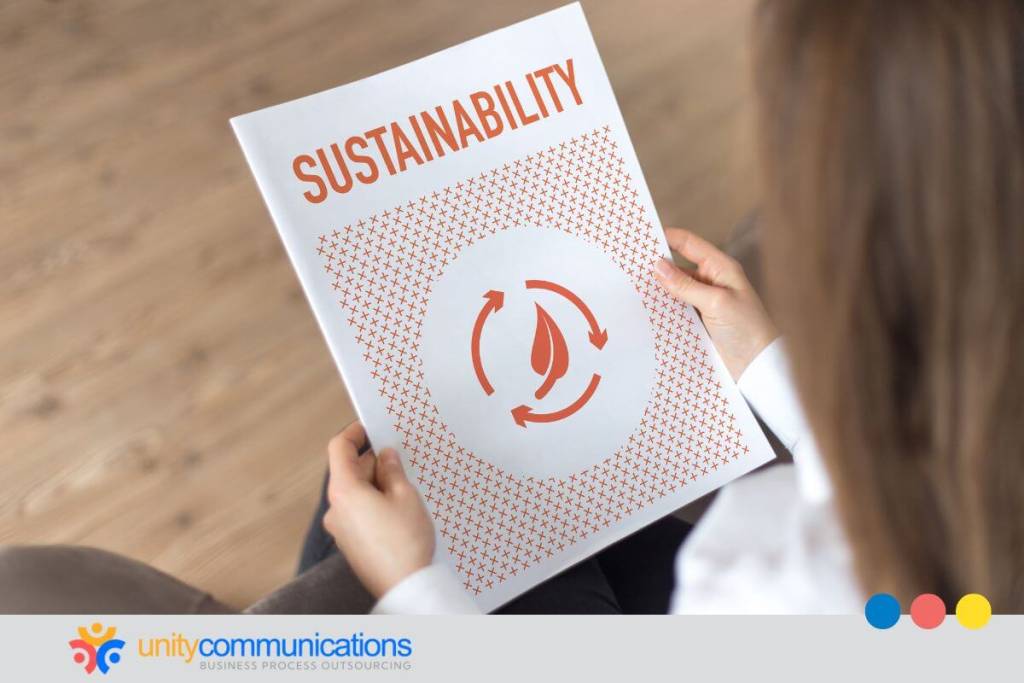Table of Contents
As the world grapples with the critical impacts of climate change, resource scarcity, and social inequality, there’s a growing demand for businesses to embrace sustainable practices. Companies now understand that sustainability isn’t just a moral or social responsibility and is vital for lasting prosperity.
Consequently, the business process outsourcing (BPO) sector is reassessing its contribution to sustainability on various fronts. Keep reading to learn more about BPO’s role in driving green initiatives and sustainability reporting.
Sustainability reporting practices in BPO

Sustainability has been shown to drive innovation, and 48% of CEOs consider boosting sustainability one of their organizations’ top priorities.
Sustainability reporting discloses an organization’s environmental, social, and governance (ESG) performance to its stakeholders. It provides information on the organization’s sustainability-related strategies, including its efforts to address ecological challenges, promote social responsibility, and uphold good governance practices.
Sustainability reporting goes beyond traditional financial reporting by providing a comprehensive view of the organization’s non-financial performance and contributions to sustainable development.
So, what is BPO’s role in sustainability reporting? BPO companies, like other businesses, increasingly recognize the importance of sustainability reporting in demonstrating their commitment to ESG principles.
Here are some common sustainability reporting practices in the BPO industry:
- Environmental impact measurement. BPO companies often measure and report their environmental impact, including energy consumption, greenhouse gas emissions, water usage, and waste generation. They may set targets to reduce their carbon footprint and report progress towards these targets in their sustainability reports.
- Renewable energy and green initiatives. Many BPO companies invest in renewable energy sources, such as solar or wind power, to reduce carbon emissions. They may also implement green initiatives such as energy-efficient lighting, recycling programs, and telecommuting to minimize their environmental impact.
- Employee welfare and diversity. BPO companies typically report on their efforts to promote social sustainability, employee welfare, and diversity. They may host initiatives for employee health and safety, diversity and inclusion, training and development, and work-life balance.
- BPO practices and governance. Sustainability reports often include information on a provider’s governance structure and business practices to ensure they are ethical and adherent to relevant regulations and standards. They may also disclose information on corporate governance policies, codes of conduct, and anti-corruption measures.
- Supply chain management. BPO companies may report on their efforts to promote sustainability within their supply chains. These could include supplier assessments, engagement with suppliers to improve environmental and social practices, and efforts to promote ethical sourcing and fair labor practices throughout the supply chain.
- Stakeholder engagement and transparency. BPO companies engage with stakeholders and provide transparent reporting on their sustainability performance. This process may involve maintaining regular communication with investors, customers, employees, and regulators and responding to stakeholder inquiries and feedback on sustainability issues.
- Community engagement and social responsibility. BPO companies often engage local communities through various social responsibility initiatives. They partner with local organizations to host volunteer programs, donation drives, or initiatives to support education, healthcare, or environmental conservation.
Challenges BPO firms face when implementing sustainability reporting

BPO providers can encounter obstacles when implementing sustainability reporting. Addressing these challenges requires a holistic approach that involves the engagement of senior leadership and stakeholders. Service providers must also invest in resources and capabilities, integrate approaches with the business strategy, and maintain transparency in reporting processes.
By overcoming these roadblocks, BPO companies can enhance their credibility, build trust with stakeholders, and drive positive impact through their sustainability efforts. Additionally, 43% of consumers consider sustainability-centric companies more likable, adding to the provider’s competitive edge. Below are some common reporting challenges and ways to address them.
Data collection and management
BPO companies may struggle to collect accurate and reliable data on their ESG performance, especially if they have complex operations or rely on subcontractors.
Solution:
To address this challenge, companies can invest in robust data management systems, automate data collection processes where possible, and establish clear data reporting and verification protocols.
BPO companies can also leverage big data analytics and business intelligence tools to analyze large volumes of data and gain insights into their environmental impact, resource usage, and operational efficiency.
Standardization and frameworks
The standardized reporting frameworks and guidelines tailored to the BPO industry are lacking, making it difficult for companies to benchmark their performance against peers and effectively communicate their sustainability efforts.
Solution:
BPO companies can address this challenge by adopting widely recognized reporting frameworks from the Global Reporting Initiative (GRI), the Sustainability Accounting Standards Board (SASB), or the Task Force on Climate-related Financial Disclosures (TCFD). Providers can customize these guidelines to suit their specific industry context.
Stakeholder engagement
Engaging stakeholders, including clients, employees, investors, and local communities, is crucial for successful sustainability reporting. However, BPO companies may face challenges in identifying and prioritizing key stakeholders, communicating effectively with diverse stakeholder groups, and addressing their varying interests and concerns.
Solution:
To overcome these challenges, companies can develop engagement strategies tailored to different stakeholder groups and solicit feedback through surveys, focus groups, and consultations. They must also be transparent about their sustainability performance and decision-making processes.
Resource constraints
BPO companies may have limited financial, human, and technological resources for sustainability reporting initiatives. Insufficient resources can hinder their ability to effectively collect data, conduct assessments, implement initiatives, and report on their sustainability performance.
Solution:
Companies can prioritize sustainability initiatives based on their materiality and potential impact to address resource constraints. They can also leverage existing resources and expertise within the organization, collaborate with industry peers, and seek external support from sustainability consultants or organizations.
Integration with business strategy
Integrating sustainability reporting into overall business and decision-making processes can be challenging for BPO companies, particularly if sustainability is perceived as a separate or peripheral issue rather than integral to core business operations.
Solution:
To overcome this BPO challenge, companies can align sustainability goals and targets with broader business objectives, incorporate sustainability criteria into performance metrics and incentives, and involve senior leadership in sustainability governance. Regularly communicating the business case for sustainability internally and externally is essential.
Risk management and disclosure
BPO companies may face risks related to sustainability issues, such as regulatory non-compliance, reputational damage, and supply chain disruptions. Effectively managing and disclosing these risks in sustainability reports requires robust risk assessment processes, scenario analysis, and transparency.
Solution:
Companies can address this challenge by conducting comprehensive risk assessments, integrating sustainability risk management frameworks, and clearly and transparently disclosing material sustainability risks and mitigation strategies in their sustainability reports.
The bottom line

Sustainability reporting practices in the BPO industry are evolving as companies recognize the importance of integrating ESG considerations into their business operations and demonstrating their commitment to sustainable development.
By leveraging technology, BPO companies can enhance sustainability reporting, reduce their environmental footprint, promote sustainable practices, and contribute to a more environmentally and socially responsible business ecosystem.
Let’s connect if you want to learn more about BPO.




